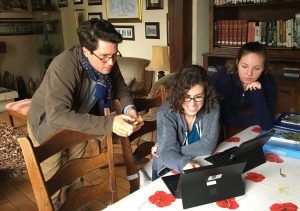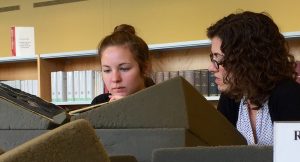By Amy Lucadamo ’00
In September #TeamPeirs celebrated our two-year anniversary of going live. As anniversaries are a time for reflection, we thought we would contribute a few pieces on what #TheStaff has taken away from working on Peirs. As we are in the midst of a crowdfunding campaign to get us over to France in March 2018, we thought it might be of interest to our readers to know what its like to work on this project.
The First World War was a war of adaptation. This is not groundbreaking research, historians and military history enthusiasts have known this for generations, but I recently discovered it. I do not know exactly when I discovered it. It might have been when I learned that English officers had wicker hampers filled with high-priced foodstuffs mailed to them on the Western Front, or when I learned that barbed wire posts were screwed into the ground because it was quieter than hammering. It could have been when I learned that some soldiers planted gardens and adopted stray cats and dogs, introducing a bit domesticity to their dugouts, or maybe when I learned that German trench systems were built with rebar and concrete. Or perhaps it was when I learned that Battalions were sometimes sent to the same trenches they had defended years before, and that when it rained or when they dug to repair walls, bones of their comrades and enemies were unearthed.
Some men did not adapt. They could not transition from home to the front and then back. But Jack Peirs did, he seemed to thrive in the leadership of the Queen’s 8th and in the execution of battle. It is not something that I can easily wrap my modern brain around. When I learned the dramatic ends to which soldiers went to get through the war that they were fighting – the tunneling, the reworking of tactics and the machinations – I almost could not believe it. The evidence is in front of me when I read Jack’s letters and it was present when I stood on the battlefields of the Somme and Ypres. It is etched into the land.

Ian Isherwood, Amy Lucadamo, and Jenna Fleming comparing Peirs photographs to battlefield sites along the Somme. Chavasse Farm, Hardecourt aux Bois, France, 2016. Photo by Kevin Lavery.
Jack’s letters are more than a man doing his duty, they are the letters of a man finding his legs, casually excelling at something that he could not have anticipated being good at. Not to be overly dramatic, but I believe that each member of #teampeirs has developed unknown skills through working on this project. In a practical sense I have learned how to use TimelineJS, StoryMapJS, WordPress. I have learned how to understand trench maps and regimental diaries and a satisfying amount of WWI slang. In a more theoretical sense I have learned to adapt my archival and history training and experience creating exhibits to an online platform. I have adapted skills and theory from academic history, like transcription and annotation, to a blog.

Jenna Fleming and Amy Lucadamo conducting archival research at the Surrey History Centre, Woking, UK. Photo by Ian Isherwood.
More importantly, though, I have had the opportunity to watch our student assistants learn new skills and assume visible roles on the project. Because they are inspired by Jack, his response to war, and our methods of delivering the project to researchers and casual viewers, they have taken on increasingly greater responsibility. Witnessing the work that this material inspires is one of the best learning experiences of my career.
